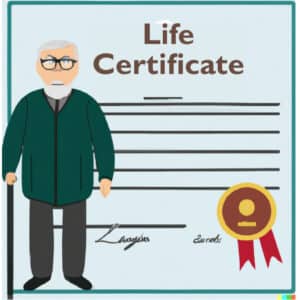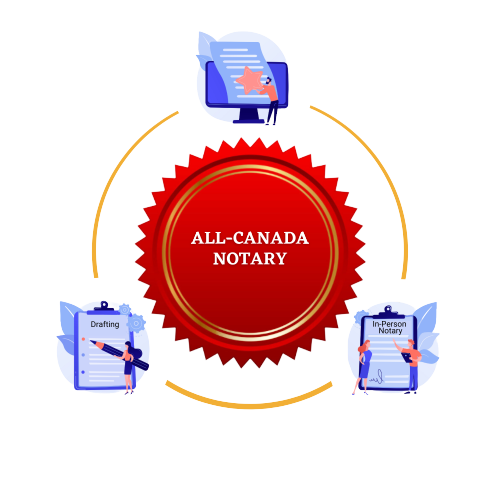
What is a Life Certificate?
A life certificate is an official document or form that verifies the existence of an individual and confirms that they are alive. It is typically required if someone lives in Canada and receives a pension from another country. It may be required by government agencies, pension authorities, insurance companies, or financial institutions to ensure that benefits or financial arrangements are not being paid out to deceased individuals. If you need your life certificate to be notarized, All-Canada Notary can help you with this.
How often a life certificate is required to compete?
The specific requirements and frequency for submitting a life certificate can vary from country to country and even between different pension schemes within a country. Typically, these certificates need to be submitted annually or at regular intervals, such as every six months.
It’s best to consult the relevant government authority or pension provider in your specific jurisdiction to get accurate and up-to-date information about the frequency of life certificate submissions.
What are the steps for obtaining and completing your certificate?
To complete a life certificate, you need to follow the specific instructions provided by the institution that requires it. Here are some general steps you can follow:
Obtain the necessary forms: Contact the institution requesting the life certificate and ask for the required forms. They may provide a physical form or direct you to an online portal where you can download or fill out the form.
Fill out the form: Carefully read the instructions on the form and provide accurate information. You may need to provide personal details such as your name, address, date of birth, pension or retirement account number, and any other relevant information.
Attach supporting documents: The organization may require you to provide supporting documents to verify your identity. Commonly requested documents include a copy of your identification (such as a passport or national ID card), proof of address (such as a utility bill or bank statement), and a recent photograph.
Sign the form: Once you have filled out the form and attached the necessary documents, sign it as instructed. Life Certificate may require notary public to authenticate your signature.
Submit the form: Return the completed form along with any supporting documents to the organization or institution as instructed. This could involve mailing the documents, submitting them in person at a designated office, or using an online submission portal, depending on the specific instructions you received.
Follow up if necessary: Keep track of your submission and make a note of any reference numbers or confirmation details provided. If you don’t receive any acknowledgment or confirmation within a reasonable time, consider contacting the institution to ensure they received your documents and have processed your life certificate.
What happens if I fail to submit the certificate?
Failure to submit a life certificate within the specified timeframe may result in the suspension or cessation of pension payments, government benefits, or other financial assistance. It is crucial to adhere to the requirements to ensure uninterrupted support.
Can someone else submit a Certificate of Life on your behalf?
Yes, in certain circumstances, someone else can submit a life certificate on your behalf. For example, if you are unable to personally visit the issuing authority or provide the necessary documentation due to illness, disability, or other valid reasons, you may appoint a representative to act on your behalf. This representative could be a family member, a trusted friend, or a legal guardian. They would typically need to present the necessary identification and provide any relevant supporting documentation to support their authority to act on your behalf.
What information is typically required in a life certificate?
Typically, a life certificate includes the following information:
- Personal Information: The life certificate will typically require the individual’s full name, address, date of birth, and gender.
- Identification: The certificate may ask for identification details such as a passport number, national identification number, or social security number.
- Declaration: The individual may need to declare that they are alive and provide their signature or a witnessed signature with the notary.
- Date of Certification: The certificate should include the date on which it was issued or signed by the individual or their witness.
- Issuing Authority: The certificate may require information about the authority or organization issuing the certificate. This can include their name, address, and contact details.
- Additional Information: Depending on the requirements of the organization or country, there may be additional information requested, such as the individual’s bank account details, pension identification number, or any other relevant identification or account numbers.
Do I need to submit a new life certificate if I change my address?
In many cases, updating your address may not require a new life certificate itself, but rather it is advisable to inform the relevant authorities or institutions that require the life certificate about your new address.
What are other names of Life Certificate?
Life Certificate is commonly referred to by various names depending on the country or context. Some of the alternative names for Life Certificate include:
- Certificate of Existence
- Proof of Life
- Pensioner’s Certificate
- Life Proof Certificate
- Certificate of Survival
- Verification of Life
- Attestation of Existence
- Certificate of Life
- Life Attestation Certificate
- Life Verification Certificate.
Which countries typically require a certificate of life from their pension recipients?
Some countries that typically require a life certificate include:
India: The Life Certificate, also known as Jeevan Pramaan, is required for Indian pensioners to continue receiving their pension. It can be obtained through various means, including biometric authentication or by submitting a physical form at designated authorities.
United Kingdom: The UK government requires pensioners living abroad to submit a life certificate to continue receiving their State Pension. The certificate needs to be completed and signed by a competent authority, such as a doctor or a lawyer.
Australia: Australian pension recipients living overseas are required to provide a life certificate or a proof-of-life statement to continue receiving their Age Pension or other social security payments. The certificate needs to be completed by an authorized witness, such as a consular officer or a notary public.
South Africa: The South African Social Security Agency (SASSA) requires life certificates from pension recipients to ensure continued eligibility for grants and pensions. Recipients are required to present themselves in person at designated SASSA offices for the verification process.
How Can All-Canada Notary help?
Yes! If your life certificate requires a notary public to authenticate your signature, All-Canada Notary can help you complete it. Book an appointment for the same-day service.

